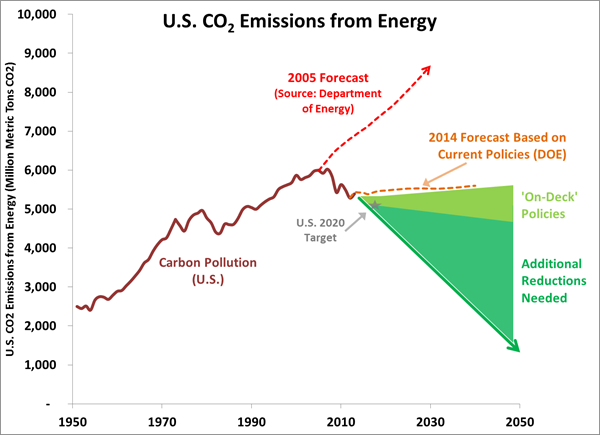Abby ran across this article on methane emission reduction and thought it would be good for class discussion if we all took a look at it.
http://www.whitehouse.gov/blog/2014/03/28/strategy-cut-methane-emissions?utm_source=twitter&utm_medium=social&utm_content=032814p1&utm_campaign=climate
Friday, March 28, 2014
Friday, March 21, 2014
(EE) Urban Nature
Recalling our earlier conversation about the potential of cities to be healthy and low-carbon, here's a discussion of "Biophilic Cities" that begins to explain how to do it. http://grist.org/cities/habitats-for-humanity-why-our-cities-need-to-be-ecosystems-too/
Monday, March 17, 2014
(WR) Religious Insight
I have noticed for some years that I tend to wear out my garden gloves asymmetrically -- one glove wears out almost twice as fast as the other. It occurs to me that one reason for this might be scriptural (specifically Matthew 6:3) -- my left hand just doesn't know what my right hand is doing! Now if only I could buy a bag of new right-handed gloves...
(WR) Everyday Karma
When we read the Bhagavad-Gita, we discussed karma as a cosmic principle -- the idea that moral action functions much like matter and energy in a causal web. This commentary from Sunday's NY Times suggests a quotidian version of such causality with the sociological observation that generosity is often contagious. Thus perhaps, as we earlier discussed, we need not concern ourselves too much with the text's metaphysical claims, but attend rather to its robust practical insights. "If you want to live in a generous community, be more generous" is a useful karmic suggestion. %2F%3Faction%3Dclick%26region%3DMasthead%26pgtype%3DHomepage%26module%3DSearchSubmit%26contentCollection%3DHomepage%26t%3Dqry917%23%2Fpay%2520it%2520forward&_r=0
Sunday, March 16, 2014
(EE) How to Feel about Climate Change
Elizabeth Kolbert makes the point that it matters less whether we care than that we do something about climate change. This is fair; ultimately ethics is about action. But of course the two are not unrelated – ethics is also about relationships, and feeling deeply about something is often a precursor, and a goad, to acting vigorously and effectively. Our actions generally follow our feelings, so learning how to feel is elemental to becoming ethical. Hence this meditation by Zadie Smith, one of the leading essayists working in English today, about how we ought to feel about climate change: http://www.nybooks.com/articles/archives/2014/apr/03/elegy-countrys-seasons/?insrc=hpma
There is an echo here of what Bill McKibben was trying to do in the first general-audience climate change book published, The End of Nature (1988) -- imagining how we should relate affectively to the planet we now inhabit, utterly and permanently transformed by us. Back then it was a little hard to credit, and some of his critics thought he was simply being idiosyncratically sentimental. Either Zadie Smith says it better, or perhaps now we're more prepared to hear it.
There is an echo here of what Bill McKibben was trying to do in the first general-audience climate change book published, The End of Nature (1988) -- imagining how we should relate affectively to the planet we now inhabit, utterly and permanently transformed by us. Back then it was a little hard to credit, and some of his critics thought he was simply being idiosyncratically sentimental. Either Zadie Smith says it better, or perhaps now we're more prepared to hear it.
Tuesday, March 11, 2014
(EE) Time to Divest in Carbon
The great Rebecca Solnit writes beautifully here about the psychology, economics, and politics of a changing climate: http://www.truth-out.org/opinion/item/22400-by-the-way-your-home-is-on-fire-the-climate-of-change-and-the-dangers-of-stasis
Saturday, March 8, 2014
(EE) Water and Meat
Perfectly timed to follow our conversations last week about the environmental impacts of animal agriculture, here's a piece in today's New York Times on water use: http://www.nytimes.com/2014/03/08/opinion/meat-makes-the-planet-thirsty.html?hp&rref=opinion&_r=0
Wednesday, March 5, 2014
(WR) How to Make a Myth
The story of the 1964 murder of Kitty Genovese, supposedly witnessed by 38 people who did nothing to help, turns out to be a durable and influential bit of mythmaking by an overwrought journalist. Even though it was, to put it generously, factually challenged, The story nonetheless did have some useful consequences -- we might say that some aspects of it are true as process though false as event. http://www.newyorker.com/arts/critics/books/2014/03/10/140310crbo_books_lemann
Monday, March 3, 2014
(EE) Be Careful with the Precautionary Principle!
Here is a short article by Cass Sunstein, professor of jurisprudence at the University of Chicago. Although I don't endorse everything he says here, he gives a useful overview of the conceptual difficulties the PP presents. http://object.cato.org/sites/cato.org/files/serials/files/regulation/2002/12/v25n4-9.pdf
(EE) Ethics and Livestock
A fully realized conception of ethics has two irreducible sides: the personal and the public. We have so far discussed a few of the personal ethical implications of meat-eating, but the policy implications of the impact of animal agriculture on climate illustrates the other indispensable ethical pole. Some people are ethical vegetarians on grounds of cruelty, the intrinsic value of life, etc., whereas others choose a meatless (or reduced meat, or entirely plant-based) diet because they want to alter the economics of food production in order to lower greenhouse gas emissions. For our purposes it is important to notice that both of these choices are based solidly on ethical considerations.
Sunday, March 2, 2014
(EE) How Not to Save the Planet
The fantasy that we can bring back headliner extinct species may someday be technically feasible, but the impulse to do so illustrates a profound misunderstanding of the problem of extinction, and the relationship between species and habitat. Check out this story in Sunday's New York Times Magazine: http://www.nytimes.com/2014/03/02/magazine/the-mammoth-cometh.html?ref=todayspaper&_r=0
Subscribe to:
Comments (Atom)

